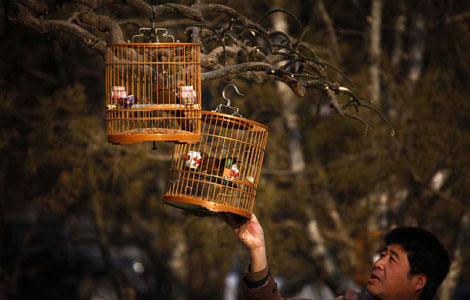Officials fired over cadmium spill
Updated: 2012-02-04 08:43
By Wang Qian (China Daily)
|
|||||||||||
BEIJING / liuzhou- Seven officials in Hechi, in South China's Guangxi Zhuang autonomous region, have been fired and two others punished on Friday following a toxic cadmium spill in a river that has threatened the water supplies to millions of people.
Among the seven who lost their jobs was Wu Haique, former head of the environmental protection bureau in Hechi. Two other officials received administrative punishment, including deputy mayor Li Wengang.
The decision was made by the regional government on the suggestion of its investigation team.
Meanwhile, environmentalists are calling for a cadmium pollution fund to be set up to compensate for the long-term impact of the spill in early January.
"The fund will be used to restore the environment and treat the victims, because cadmium poisoning is a chronic disease," Ma Yong, director of the Environmental Legal Service Center of the All-China Environment Federation, told China Daily on Friday.
Cadmium poisoning can cause softening of the bones and kidney failure, even leading to death over a period of two to 20 years. There is no cure for cadmium poisoning.
Zhai Hongling, deputy director of the press and information office of the Hechi, said that experts were assessing the effects on environment and people. She said that when these are determined, the city, the Guangxi Zhuang autonomous region, will find solutions, and she will ensure that the public get satisfying answers.
Ma and his team went last weekend to the village of Luoshan, in Hechi, which is near the Lalang hydropower station, where the cadmium pollution was detected. Villagers had found dead fish there two days before the pollution was detected on Jan 15.
The local government prohibited people from using the river water and since Jan 18 sent drinking water, Zhai said.
But Luoshan residents who got drinking water from the river had been exposed to the pollution for five days before the water shipments arrived.
Some residents of the nearby village of Guangxiatun want the government to arrange complete medical examinations for them at hospitals, Phoenix TV reported on Friday.
Huang Zhijun, a Guangxiatun resident, said his 1-year-old grandson has been coughing recently and had diarrhea for unknown reasons.
But Xiao Wenlian, director of the occupational health department of the Liuzhou disease control and prevention center, said the cadmium spill will not cause direct damage.
"Even if people drink seven liters of water with twice the permitted cadmium level, it would take 50 years to get kidney damage," Xiao said.
Xiao added that there have been no reports of cadmium poisoning.
But Huang insisted that the government should give physical examinations to all of the villagers, if only to clear their doubts.
In addition to the fear of cadmium poisoning, fishermen close to the polluted stretch of the river are suffering economically.
Luoshan is a small village, but more than 40 households depend on the fisheries.
"According to our estimates, the losses in fisheries in Luoshan alone amount at least to 4 million yuan ($635,000)," said Ma, of the legal service center.
Hechi authorities estimated that more than 40,000 kilograms of fish were found dead from Jan 15 to Feb 2 in the Longjiang River within the city limits.
Although local authorities have promised people affected by the spill will get compensation after the responsible companies are determined, many fishermen have consulted Ma about filing lawsuits to recoup their losses.
Cadmium has polluted up to 300 kilometers of the Longjiang River in the Guangxi region and threatened the drinking water of millions of people.
Eight executives from Jinhe Mining Co and Jinchengjiang Hongquan Materials Factory were detained as of Thursday and four others had fled, according to Hechi authorities.
Regional authorities say they have brought the pollution under control and guarantee the safety of the water supply of the downstream population.
Huang Feifei in Liuzhou, Guangxi, contributed to this story.
Hot Topics
Kim Jong-il, Mengniu, train crash probe, Vaclav Havel, New Year, coast guard death, Internet security, Mekong River, Strait of Hormuz, economic work conference
Editor's Picks

|

|

|

|

|

|







